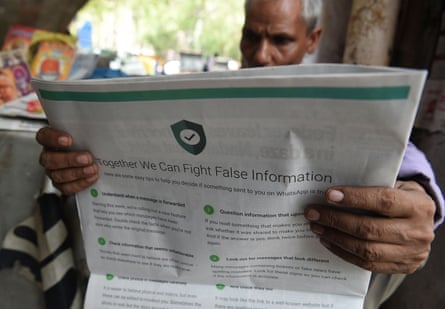[ad_1]
In the spring, because the virus swept internationally and billions of individuals had been compelled to remain at house, the recognition of 1 social media app rose extra sharply than every other. By late March, utilization of WhatsApp world wide had grown by 40%. In Spain, the place the lockdown was significantly strict, it rose by 76%. In these early months, WhatsApp – which hovers neatly between the house of electronic mail, Fb and SMS, permitting textual content messages, hyperlinks and pictures to be shared between teams – was a chief conduit by way of which waves of stories, memes and mass nervousness travelled.
At first, most of the new makes use of had been heartening. Mutual help teams sprung as much as assist the weak. Households and mates used the app to remain shut, sharing their fears and issues in actual time. But by mid-April, the function that WhatsApp was taking part in within the pandemic appeared considerably darker. A conspiracy concept concerning the rollout of 5G, which originated lengthy earlier than Covid-19 had appeared, now claimed that cell phone masts had been answerable for the illness. Throughout the UK, folks started setting fireplace to 5G masts, with 20 arson assaults over the Easter weekend alone.
WhatsApp, together with Fb and YouTube, was a key channel by way of which the conspiracy concept proliferated. Some feared that the exact same group teams created throughout March had been now accelerating the unfold of the 5G conspiracy concept. In the meantime, the app was additionally enabling the unfold of faux audio clips, reminiscent of a broadly shared recording through which somebody who claimed to work for the NHS reported that ambulances would not be despatched to help folks with respiration difficulties.
This was not the primary time that WhatsApp has been embroiled in controversy. Whereas the “pretend information” scandals surrounding the 2016 electoral upsets within the UK and US had been extra centered upon Fb – which owns WhatsApp – subsequent electoral victories for Jair Bolsonaro in Brazil and Narendra Modi in India had been aided by incendiary WhatsApp messaging, exploiting the huge attain of the app in these nations. In India, there have additionally been stories of riots and not less than 30 deaths linked to rumours circulating on WhatsApp. India’s Ministry of Data and Broadcasting has sought methods of regulating WhatsApp content material, although this has led to new controversies about authorities infringement on civil liberties.

As ever, there’s a danger of pinning an excessive amount of blame for advanced political crises on an inert expertise. WhatsApp has additionally taken some steps to restrict its use as a car for misinformation. In March, a WhatsApp spokesperson informed the Washington Publish that the corporate had “engaged well being ministries world wide to supply easy methods for residents to obtain correct details about the virus”. However even away from such seen disruptions, WhatsApp does appear to be an unusually efficient car for sowing mistrust in public establishments and processes.
A WhatsApp group can exist with out anybody exterior the group figuring out of its existence, who its members are or what’s being shared, whereas end-to-end encryption makes it resistant to surveillance. Again in Britain’s pre-Covid-19 days, when Brexit and Jeremy Corbyn had been the problems that provoked probably the most feverish political discussions, hypothesis and paranoia swirled round such teams. Media commentators who defended Corbyn had been usually accused of belonging to a WhatsApp group of “outriders”, co-ordinated by Corbyn’s workplace, which supposedly informed them what line to take. In the meantime, the Conservative occasion’s pro-Brexit European Analysis Group was stated to be mainly sustained within the type of a WhatsApp group, whose membership was by no means public. Secretive coordination – each actual and imagined – doesn’t strengthen confidence in democracy.
WhatsApp teams cannot solely breed suspicion among the many public, but additionally manufacture a temper of suspicion amongst their very own contributors. As additionally demonstrated by closed Fb teams, discontents – not all the time well-founded – accumulate in non-public earlier than boiling over in public. The capability to flow into misinformation and allegations is changing into higher than the capability to resolve them.
The political risk of WhatsApp is the flipside of its psychological attraction. In contrast to so many different social media platforms, WhatsApp is constructed to safe privateness. On the plus facet, this implies intimacy with these we care about and a capability to talk freely; on the damaging facet, it injects an ethos of secrecy and suspicion into the general public sphere. As Fb, Twitter and Instagram turn into more and more theatrical – each gesture geared to impress an viewers or deflect criticism – WhatsApp has turn into a sanctuary from a complicated and untrustworthy world, the place customers can communicate extra frankly. As belief in teams grows, so it’s withdrawn from public establishments and officers. A brand new widespread sense develops, based on instinctive suspicion in direction of the world past the group.
The continued rise of WhatsApp, and its problem to each legacy establishments and open social media, poses a profound political query: how do public establishments and discussions retain legitimacy and belief as soon as persons are organised into closed and invisible communities? The chance is that a vicious circle ensues, through which non-public teams flow into ever extra data and disinformation to discredit public officers and public data, and our alienation from democracy escalates.
When WhatsApp was purchased by Fb in 2014 for $19bn, it was probably the most invaluable tech acquisition in historical past. On the time, WhatsApp introduced 450 million customers with it. In February this yr, it hit 2 billion customers worldwide – and that’s even earlier than its lockdown surge – making it by far probably the most broadly used messenger app, and the second mostly used app after Fb itself. In lots of nations, it’s now the default technique of digital communication and social coordination, particularly amongst youthful folks.
The options that might later enable WhatsApp to turn into a conduit for conspiracy concept and political battle had been ones by no means integral to SMS, and have extra in widespread with electronic mail: the creation of teams and the flexibility to ahead messages. The power to ahead messages from one group to a different – just lately restricted in response to Covid-19-related misinformation – makes for a potent informational weapon. Teams had been initially restricted in dimension to 100 folks, however this was later elevated to 256. That’s sufficiently small to really feel unique, but when 256 folks ahead a message on to a different 256 folks, 65,536 may have obtained it.
Teams originate for all types of functions – a celebration, organising newbie sport, a shared curiosity – however then tackle a lifetime of their very own. There may be an anarchic playfulness about this, as a gaggle takes by itself set of in-jokes and traditions. In a New York Journal piece final yr, underneath the headline “Group chats are making the web enjoyable once more”, the expertise critic Max Learn argued that teams have turn into “an outright substitute for the defining mode of social group of the previous decade: the platform-centric, feed-based social community.”
It’s comprehensible that to be able to chill out, customers have to know they’re not being overheard – although there’s a much less playful facet to this. If teams are perceived as a spot to say what you actually suppose, away from the constraints of public judgement or “political correctness”, then it follows that also they are the place folks flip to share prejudices or extra hateful expressions, which can be unacceptable (and even unlawful) elsewhere. Santiago Abascal, the chief of the Spanish far-right occasion Vox, has outlined his occasion as one keen to “defend what Spaniards say on WhatsApp”.

A special kind of group emerges the place its members are all customers of the identical service, reminiscent of a college, a housing block or a coaching programme. A possible drawback right here is one in all damaging solidarity, through which emotions of group are deepened by turning towards the service in query. Teams of this kind sometimes begin from a want to pool data – college students staying in contact about deadlines, say – however can swiftly turn into a way of discrediting the establishment they cluster round. Preliminary murmurs of dissatisfaction can escalate quickly, till the group has solid an identification round a spirit of resentment and alienation, which may then be unattainable to dislodge with countervailing proof.
Confronted with the rise of recent applied sciences, one possibility for formal organisations and associations is to comply with folks to their most popular platform. In March, the federal government launched a WhatsApp-based data service about Covid-19, with an automatic chatbot. However teams themselves may be an unreliable technique of getting essential data to folks. Anecdotal proof from native political organisers and commerce union reps means that, regardless of the preliminary effectivity of WhatsApp teams, their workload usually will increase due to the escalating variety of sub-communities, every of which must be contacted individually. Colleges desperately search to get data out to folks, solely to find that except it seems in exactly the precise WhatsApp group, it doesn’t register. The age of the message board, be it bodily or digital, the place data may be posted as soon as for anybody who wants it, is over.
WhatsApp’s ‘broadcast listing’ perform, which permits messages to be despatched to a number of recipients who’re invisible to 1 one other (like electronic mail’s ‘bcc’ line), alleviates a number of the issues of teams taking over a lifetime of their very own. However even then, lists can solely embrace people who find themselves already mutual contacts of the list-owner. The issue, from the viewpoint of establishments, is that WhatsApp use appears fuelled by a choice for casual, non-public communication as such. College lecturers are often baffled by the invention that many college students and candidates don’t learn electronic mail. If electronic mail goes into decline, WhatsApp doesn’t appear to be a viable various in the case of sharing verified data as broadly and inclusively as doable.
Teams are nice for transient bursts of humour or frustration, however, by their very nature, far much less helpful for supporting the circulation of public data. To know why that is the case, we now have to consider the way in which through which people can turn into swayed and influenced as soon as they belong to a gaggle.
The web has introduced with it its personal litany of social pathologies and threats. Trolling, flaming, doxing, cancelling and pile-ons are all dangers that go together with socialising inside an unlimited open structure. “Open” platforms reminiscent of Twitter are reminders that a lot social exercise tends to be aimed toward a small and choose group, however may be rendered comical or shameful when uncovered to a special group altogether.
As any frequent consumer of WhatsApp or a closed Fb group will recognise, the ethical nervousness related to teams is somewhat completely different. If the fear in an open community is of being judged by some exterior observer, be it one’s boss or an prolonged member of the family, in a closed group it’s of claiming one thing that goes towards the codes that anchor the group’s identification. Teams can quickly turn into dominated by a sure tone or worldview that’s uncomfortable to problem and nigh-impossible to dislodge. WhatsApp is a machine for producing emotions of fake pas, as feedback linger in a gaggle’s feed, ready for a response.
Because of this whereas teams can generate excessive ranges of solidarity, which may in precept be put to highly effective political impact, it additionally turns into more durable to precise disagreement throughout the group. If, for instance, an outspoken and common member of a neighbourhood WhatsApp group begins to flow into misinformation about well being dangers, the overall urge to keep up solidarity implies that their messages are more likely to be met with approval and thanks. When a declare or piece of content material reveals up in a gaggle, there could also be many members who view it as doubtful; the query is whether or not they have the arrogance to say as a lot. In the meantime, the much less sceptical can merely ahead it on. It’s not exhausting, then, to grasp why WhatsApp is a robust distributor of “pretend information” and conspiracy theories.
As on open social platforms, one of many chief methods of constructing solidarity on WhatsApp is to posit some injustice or enemy that threatens the group and its members. In probably the most acute examples, conspiracy theories are unleashed towards political opponents, to the impact that they’re paedophiles or secret associates of overseas powers. Such plausibly deniable practices swirled across the fringes of the profitable election campaigns of Modi, Bolsonaro and Donald Trump, and throughout a number of platforms.

However what makes WhatsApp probably extra harmful than public social media are the upper ranges of belief and honesty which can be usually current in non-public teams. It’s a truism that no one is as glad as they seem on Fb, as engaging as they seem on Instagram or as offended as they seem on Twitter, which spawns a rising weariness with such limitless efficiency. In contrast, closed teams are the place folks take off their public masks and let their vital guard down. Neither anonymity (a precondition of most trolling) nor movie star are on provide. The velocity with which rumours flow into on WhatsApp is partly a mirrored image of how altruistic and uncritical folks may be in teams. More often than not, folks appear to share false theories about Covid-19 not with the intention of doing hurt, however exactly out of concern for different group members. Anti-vaxx, anti-5G or anti-Hillary rumours mix an identification of an enemy with a robust inside sense of solidarity. However, they add to the sense that the world is hostile and harmful.
There’s one specific sample of a gaggle chat that may manufacture threats and injustices out of skinny air. It tends to start out with one participant speculating that they’re being let down or focused by some establishment or rival group – be it a public service, enterprise or cultural group – whereupon a second participant agrees. By this stage, it turns into dangerous for anybody else to defend the establishment or group in query, and instantly a brand new enemy and a brand new resentment is born. Immediately, the warnings and denunciations emanating from throughout the group tackle a degree of authenticity that can’t be matched by the entity that’s now the thing of derision.
However what if the primary contributor has misunderstood or misinterpret one thing, or had a really worrying day and must let off steam? And what if the second is merely agreeing in order to make the primary one really feel higher? And what if the opposite members are both too distracted, too inhibited or too exhausted to say something to oppose this contemporary indignation? This needn’t snowball into the types of conspiracy concept that produce riots or arson assaults. However even in milder types, it makes the job of speaking official data – sometimes life-saving data – much more troublesome than it was only a decade in the past. Details about public providers and well being dangers is more and more having to penetrate a thicket of overlapping teams, lots of which can have developed an instinctive scepticism to something emanating from the “mainstream”.
A part of the problem for establishments is that there’s usually a wierd emotional consolation within the shared feeling of alienation and passivity. “We had been by no means knowledgeable about that”, “no one consulted us”, “we’re being ignored”. These are dominant expressions of our political zeitgeist. As WhatsApp has turn into an more and more widespread means of encountering data and information, a vicious circle can ensue: the general public world appears ever extra distant, impersonal and pretend, and the non-public group turns into an area of sympathy and authenticity.
It is a new twist within the evolution of the social web. Because the 90s, the web has held out a promise of connectivity, openness and inclusion, solely to then confront inevitable threats to privateness, safety and identification. In contrast, teams make folks really feel safe and anchored, but additionally assist to fragment civil society into separate cliques, unknown to 1 one other. That is the end result of greater than 20 years of ideological battles over what kind of social house the web needs to be.
For just a few years on the daybreak of the millennium, the O’Reilly Rising Expertise Conferences (or ETech), had been a crucible through which a brand new digital world was imagined and debated. Launched by the west coast media entrepreneur Tim O’Reilly and hosted yearly round California, the conferences attracted a mix of geeks, gurus, designers and entrepreneurs, introduced collectively extra in a spirit of curiosity than of commerce. In 2005, O’Reilly coined the time period “internet 2.zero” to explain a brand new wave of internet sites that linked customers with one another, somewhat than with current offline establishments. Later that yr, the area title fb.com was bought by a 21-year-old Harvard scholar, and the age of the large social media platforms was born.
Inside this quick window of time, we will see competing concepts of what a fascinating on-line group may appear to be. The extra idealistic tech gurus who attended ETech insisted that the web ought to stay an open public house, albeit one through which choose communities may cluster for their very own specific functions, reminiscent of creating open-source software program initiatives or Wikipedia entries. The untapped potential of the web, they believed, was for higher democracy. However for firms reminiscent of Fb, the web offered a possibility to gather knowledge about customers en masse. The web’s potential was for higher surveillance. The rise of the large platforms from 2005 onwards urged the latter view had received out. And but, in a wierd twist, we at the moment are witnessing a revival of anarchic, self-organising digital teams – solely now, within the palms of Fb as effectively. The 2 competing visions have collided.

To see how this story unfolded, it’s value going again to 2003. On the ETech convention that yr, a keynote speech was given by the net fanatic and author Clay Shirky, now a tutorial at New York College, which stunned its viewers by declaring that the duty of designing profitable on-line communities had little to do with expertise in any respect. The discuss appeared again at one of the fertile durations within the historical past of social psychology, and was entitled “A bunch is its personal worst enemy”.
Shirky drew on the work of the British psychoanalyst and psychologist Wilfred Bion, who, along with Kurt Lewin, was one of many pioneers of the research of “group dynamics” within the 40s. The central proposition of this faculty was that teams possess psychological properties that exist independently of their particular person members. In teams, folks discover themselves behaving in ways in which they by no means would if left to their very own gadgets.
Like Stanley Milgram’s infamous collection of experiments to check obedience within the early 60s – through which some contributors had been persuaded to manage apparently painful electrical shocks to others – the mid-20th century concern with group dynamics grew within the shadow of the political horrors of the 30s and 40s, which had posed grave questions on how people come to desert their bizarre sense of morality. Lewin and Bion posited that teams possess distinctive personalities, which emerge organically by way of the interplay of their members, independently of what guidelines they could have been given, or what people may rationally do alone.
With the daybreak of the 60s, and its extra individualistic political hopes, psychologists’ curiosity in teams began to wane. The belief that people are ruled by conformity fell by the wayside. When Shirky launched Bion’s work on the O’Reilly convention in 2003, he was going out on a limb. What he appropriately noticed was that, within the absence of any express buildings or guidelines, on-line communities had been battling towards most of the disruptive dynamics that fascinated the psychologists of the 40s.
Shirky highlighted one space of Bion’s work specifically: how teams can spontaneously sabotage their very own stipulated objective. The great thing about early on-line communities, reminiscent of listservs, message boards and wikis, was their spirit of egalitarianism, humour and informality. However these similar properties usually labored towards them when it got here to truly getting something constructive finished, and will generally snowball into one thing obstructive or offended. As soon as the temper of a gaggle was diverted in direction of jokes, disruption or hostility in direction of one other group, it grew to become very tough to wrest it again.
Bion’s issues originated in concern of humanity’s darker impulses, however the imaginative and prescient Shirky was placing to his viewers that day was a extra optimistic one. If the designers of on-line areas may preempt disruptive “group dynamics”, he argued, then it could be doable to assist cohesive, productive on-line communities that remained open and helpful on the similar time. Like a effectively designed park or avenue, a well-designed on-line house may nurture wholesome sociability with out the necessity for policing, surveillance or closure to outsiders. Between one excessive of anarchic chaos (fixed trolling), and one other of strict moderation and regulation of dialogue (acceding to an authority determine), considering when it comes to group dynamics held out the promise of a social internet that was nonetheless largely self-organising, but additionally comparatively orderly.
However there was one other resolution to this similar drawback ready within the wings, which might develop into world-changing in its penalties: overlook group dynamics, and concentrate on status dynamics as a substitute. If somebody on-line has a sure set of offline attributes, reminiscent of a job title, an album of tagged pictures, an inventory of mates and an electronic mail tackle, they may behave themselves in methods which can be applicable to all of those fastened public identifiers. Add increasingly surveillance into the combination, each by one’s friends and by firms, and the issue of spontaneous group dynamics disappears. It’s simpler to carry on to your self-control and your conscience if you’re publicly seen, together with to mates, prolonged household and colleagues.
For most of the Californian pioneers of cyberculture, who cherished on-line communities as an escape from the values and constraints of capitalist society, Zuckerberg’s triumph represents an unmitigated defeat. Firms had been by no means meant to grab management of this house. As late as 2005, the hope was that the social internet can be constructed round democratic ideas and bottom-up communities. Fb deserted all of that, by merely turning the web right into a multimedia phone listing.
The final ETech was held in 2009. Inside a decade, Fb was being accused of pushing liberal democracy to the brink and even destroying fact itself. However because the calls for of social media have turn into extra onerous, with every of us curating a profile and projecting an identification, the lure of the autonomous group has resurfaced as soon as once more. In some respects, Shirky’s optimistic concern has now turn into as we speak’s pessimistic one. Partly due to WhatsApp, the unmoderated, self-governing, amoral collective – bigger than a dialog, smaller than a public – has turn into a dominant and disruptive political drive in our society, a lot as figures reminiscent of Bion and Lewin feared.
Conspiracy theories and paranoid group dynamics had been options of political life lengthy earlier than WhatsApp arrived. It is mindless accountable the app for his or her existence, any greater than it is sensible accountable Fb for Brexit. However by contemplating the sorts of behaviour and social buildings that applied sciences allow and improve, we get a greater sense of a few of society’s traits and illnesses. What are the overall tendencies that WhatsApp helps to speed up?
To begin with, there’s the issue of conspiracies normally. WhatsApp is definitely an unbeatable conduit for circulating conspiracy theories, however we should additionally admit that it appears to be a superb device for facilitating genuinely conspiratorial behaviour. One of many nice difficulties when contemplating conspiracy theories in as we speak’s world is that, no matter WhatsApp, some conspiracies develop into true: contemplate Libor-fixing, phone-hacking, or efforts by Labour occasion officers to thwart Jeremy Corbyn’s electoral prospects. These all occurred, however one would have seemed like a conspiracy theorist to counsel them till they had been later confirmed by proof.
A communication medium that connects teams of as much as 256 folks, with none public visibility, working through the telephones of their pockets, is by its very nature, well-suited to supporting secrecy. Clearly not each group chat counts as a “conspiracy”. But it surely makes the query of how society coheres, who’s related to whom, right into a matter of hypothesis – one thing that includes a hint of conspiracy concept. In that sense, WhatsApp isn’t just a channel for the circulation of conspiracy theories, however provides content material for them as effectively. The medium is the message.
The complete political potential of WhatsApp has not been witnessed within the UK. Thus far, it has not served as an efficient political campaigning device, partly as a result of customers appear reluctant to affix massive teams with folks they don’t know. Nonetheless, the affect – imagined or actual – of WhatsApp teams inside Westminster and the media undoubtedly contributes to the deepening sense that public life is a sham, behind which lurk invisible networks by way of which energy is coordinated. WhatsApp has turn into a type of “backstage” of public life, the place it’s assumed folks articulate what they actually suppose and consider in secret. It is a sensibility that has lengthy fuelled conspiracy theories, particularly antisemitic ones. Invisible WhatsApp teams now provide a contemporary replace to the kind of “rationalization” that when revolved round Masonic lodges or the Rothschilds.
Away from the world of occasion politics and information media, there’s the prospect of a society organised as a tapestry of overlapping cliques, every with their very own inside norms. Teams are much less more likely to encourage heterodoxy or risk-taking, and extra more likely to inculcate conformity, albeit usually to a set of norms hostile to these of the “mainstream”, whether or not that be the media, politics or skilled public servants merely doing their jobs. Within the security of the group, it turns into doable to have one’s cake and eat it, to be concurrently radical and orthodox, hyper-sceptical and but unreflective.
For all the advantages that WhatsApp provides in serving to folks really feel near others, its speedy ascendency is one additional signal of how a standard public world – based mostly upon verified information and recognised procedures – is disintegrating. WhatsApp is effectively outfitted to assist communications on the margins of establishments and public dialogue: backbenchers plotting coups, dad and mom gossipping about academics, mates sharing edgy memes, journalists circulating rumours, members of the family forwarding on unofficial medical recommendation. A society that solely speaks actually on the margins like this can discover it more durable to maintain the legitimacy of specialists, officers and representatives who, by definition, function within the highlight. In the meantime, mistrust, alienation and conspiracy theories turn into the norm, chipping away on the establishments that may maintain us collectively.
• Observe the Lengthy Learn on Twitter at @gdnlongread, and signal as much as the lengthy learn weekly electronic mail right here
[ad_2]
Source link





